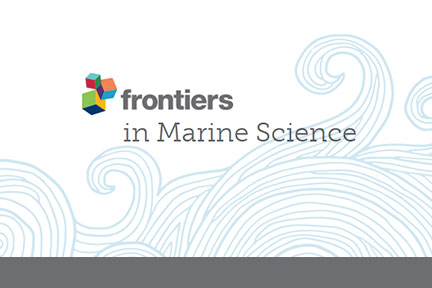June 06, 2018, Greensboro, N.C. Published in the current edition of the Journal of Frontiers in Marine Science, “The Role of Horseshoe Crabs in the Biomedical Industry and Recent Trends Impacting Species Sustainability” provides a comprehensive, current review of factors affecting the Atlantic horseshoe crab (Limulus polyphemus). In addition to highlighting its importance and the challenges facing this ancient species dating back some 450 million years, the work was spearheaded by Jordan Krisfalusi-Gannon and Waleed Ali, who were sponsored as Kepley BioSystems (KBI) interns under the National Science Foundation (NSF) Research Experience for Undergraduates (REU) program in 2017.
The REU program attracts highly motivated college students and awards internships with NSF grant-funded companies to acquire relevant research experience, encourage careers in science, and teach how to bring an innovation to market. Krisfalusi-Gannon is a biology major and conservationist attending High Point University in North Carolina. Ali is attending the University of Columbia in New York and will continue to pursue a dual doctoral degree in medicine and philosophy (MD-PhD) next year. Through this NSF program, both students participated in a summer research project at Kepley BioSystems in Greensboro, North Carolina.
Their work included identification of the key chemotactic molecules for a sustainable bait alternative that promises the potential to replace the use of threatened forage fish in the global crustacean fishing industry. While helping to develop the synthetic Kepley BioSystems bait, field study participants expressed interest in an alternative to horseshoe crabs used as a bait for eels and whelks. After completing their bait research, Krisfalusi-Gannon and Ali began their exhaustive literature review on the ecology and preservation of the horseshoe crabs, which they ultimately consolidated in their first peer-reviewed publication.
"We were inspired by Jordan and Waleed’s dedication and work ethic throughout their internships. They were passionate about the plight of the horseshoe crab, as evidenced by the care taken to produce this manuscript,” said Dr. Anthony Dellinger, President of Kepley BioSystems, Inc. “It was also a pleasure working with Frontiers in Marine Science in refining this review for publication, all thanks to the National Science Foundation for their support in shaping the future of young scientists.”
Horseshoe “crabs” are actually arthropods, a species of marine spider that is distributed across the Atlantic Coast of the United States and the Gulf of Mexico. Their well-known “blue blood” plays a less familiar but integral role in ensuring the safety and sterility of injectable drugs and implantable medical devices: it has a unique capacity for detection of dangerous pathogens with parts per trillion sensitivity. Derived from their “hemolymph,” the Limulus amebocyte lysate (LAL) assay is used as the primary FDA-approved standard for detection of gram-negative bacteria throughout the pharmaceuticals and medical device industry.
In addition to safeguarding human medicine, horseshoe crabs also comprise a keystone species in their ecosystem. Each year, after flying several thousand miles, flocks of migrating shorebirds arrive along the US Eastern seaboard, exhausted and emaciated, and just in time for the horseshoe crab spawning season. The birds feast on millions of horseshoe crab eggs before continuing to Northern breeding grounds. However, many of these migrating bird species have been declining in tandem with diminishing horseshoe crab populations; the latter, as a result of climate change and habitat destruction, continued impact from biomedical capture, bleeding and release – and consumption as fishing industry bait.
“The Role of Horseshoe Crabs in the Biomedical Industry and Recent Trends Impacting Species Sustainability” is an open-access publication and can be read online at the Frontiers for Marine Science site, frontiersin.org.
Frontiers in Marine Science publishes rigorously peer-reviewed research that advances understanding of all aspects of the environment, biology, ecosystem functioning and human interactions with the oceans. Field Chief Editor Carlos M. Duarte at King Abdullah University of Science and Technology Thuwal is supported by an outstanding Editorial Board of international researchers. This multidisciplinary open-access journal is at the forefront of disseminating and communicating scientific knowledge and impactful discoveries to researchers, academics, policy makers and the public worldwide.

